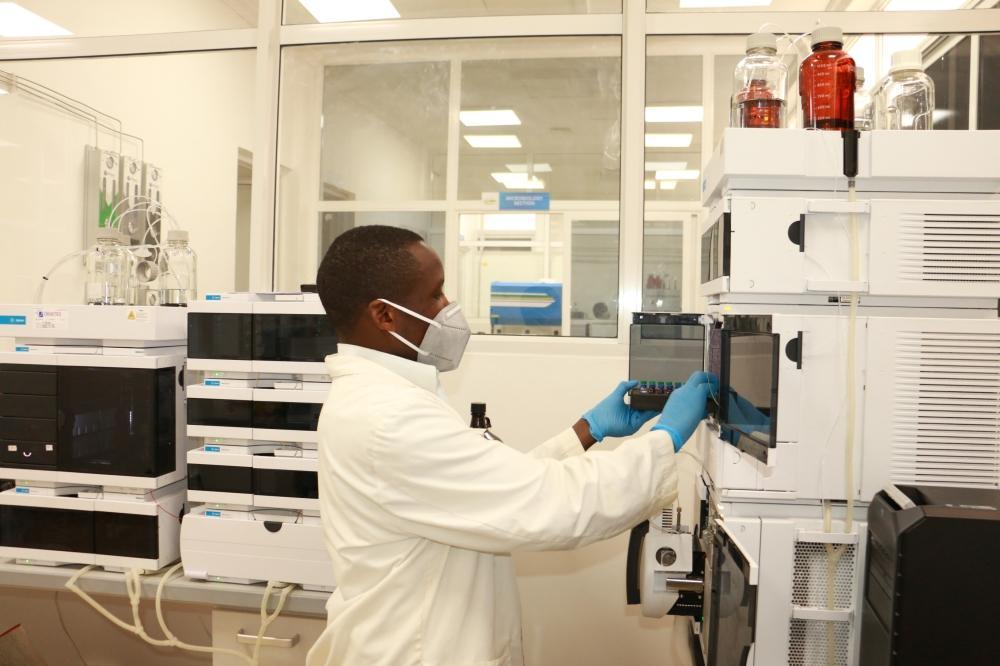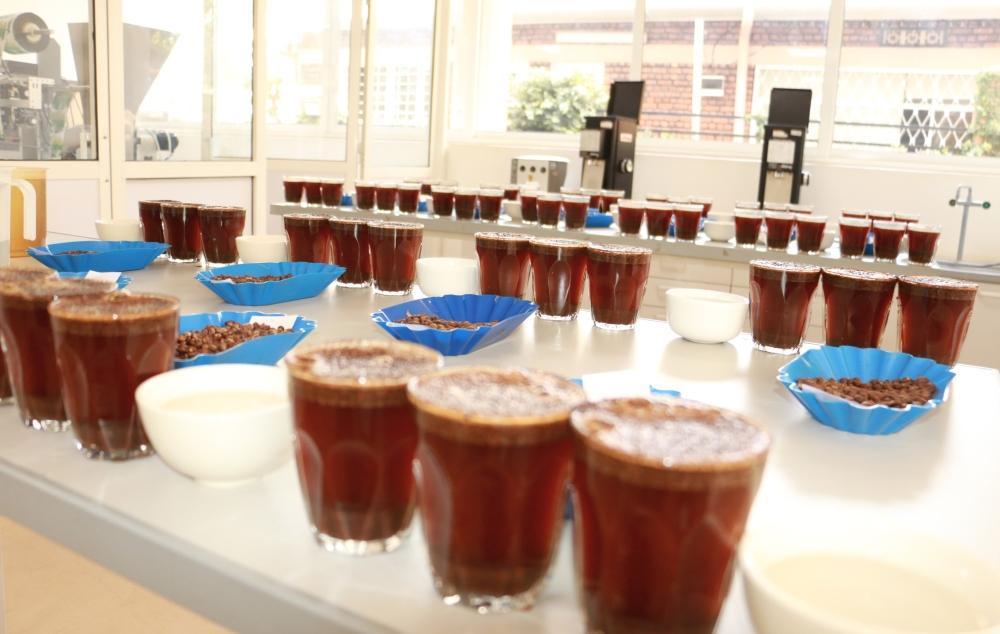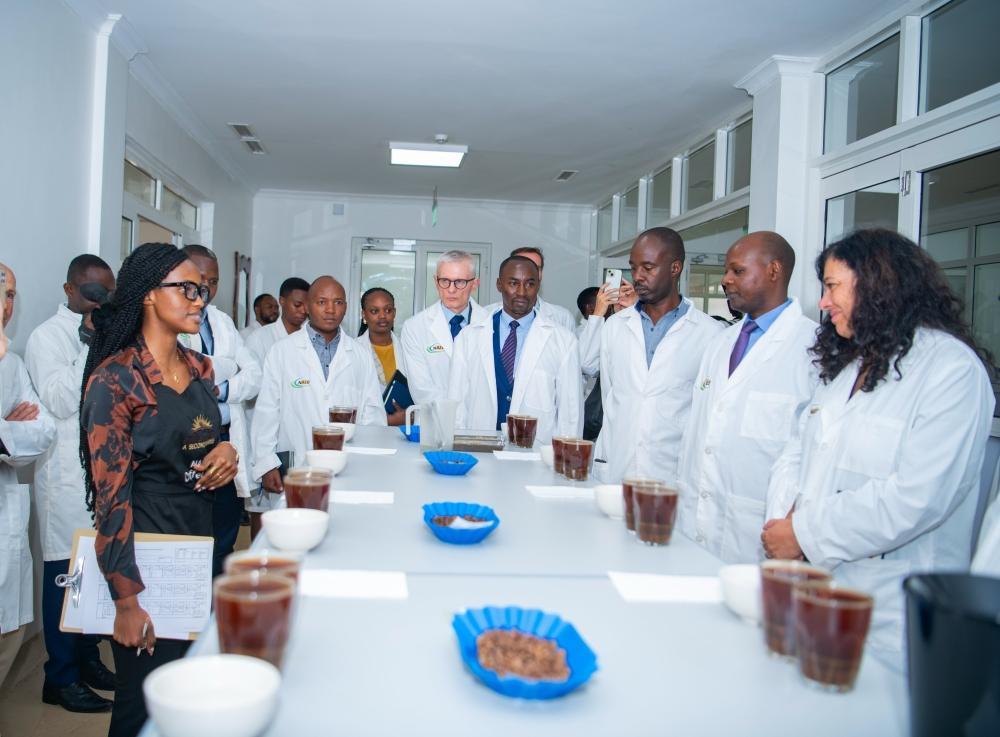Africa-Press – Rwanda. Rwanda has inaugurated a new one-stop centre lab for agricultural exports quality testing, The New Times has learnt.
The Specialised Export Quality Infrastructure (SEQI) aims to improve the quality of agricultural exports, increase market access, enhance export competitiveness, and meet international quality standards, thereby reducing the risk of export rejections, officials said.
The facility located in Kicukiro District at the head office of the National Agricultural Export Development Board (NAEB) offers more than just laboratory services. It also issues quality certificates based on product testing for agricultural and livestock goods for export.
The €3.4 million laboratory (approx. Rwf5 billion) funded by the European Union is responsible for testing, certifying, and accrediting agricultural products for export.
The lab is built on key pillars such as standards, metrology, testing, certification, and accreditation, which support quality assessment processes.
These processes are essential for demonstrating compliance with quality requirements and confirming that products meet specific market standards through laboratory analysis and measurement.
The Minister of Agriculture and Animal Resources, Mark Cyubahiro Bagabe, told The New Times that the upgraded lab will test tea, coffee, and horticultural crops, including French beans, tomatoes, chili pepper, and avocados, among others.
“The international market has standard requirements. The one-stop centre lab will help Rwandan exporters meet such requirements,” the minister explained.
He added that the lab can detect pesticide residues, heavy metals that pollute the soil, and other harmful substances that may affect agricultural products.
Coffee testing is part of the lab’s services.
When produce is exported with signs of such contamination, he said, it is thrown away, and exporters suffer losses.
He explained that with this new facility, Rwanda can reduce export rejections and border interceptions, citing previous rejections of chili exports due to pesticide residues.
Some Rwandan exporters who had sent shipments of chilli pepper to the United Kingdom , in 2020, reported that their produce was held for inspection and was damaged during the process.
“Our new lab aims to enhance Rwanda’s capacity to test agricultural exports, ensure compliance with international standards, especially EU requirements,” he said. It will also improve the country’s competitiveness in global markets, and support food safety, environmental protection, and sustainable economic growth.
“It will also build trust with international markets, which is crucial, as once lost, trust is difficult to regain,” he noted.
Testing 200 parameters
The lab is currently testing more than 200 parameters, covering soil, water, plants, food, animal feed, coffee and tea (sensory analysis), pesticides, mycotoxins, microbiology, and food additives, among others.
Tea testing includes checking for moisture, colour, size, shape, sorting, and aroma. Brewed tea is tested for colour, strength, flavour, and freshness.
Coffee testing involves analysing moisture, water activity, bean size, defects, aroma, flavour, aftertaste, acidity, body, balance, sweetness, uniformity, and cleanliness.
The soil, in which crops are grown, is tested for harmful metals such as lead, mercury, and cadmium, as well as for nutrients, minerals, pH, acidity, organic matter, water flow, and moisture.
Plants are analysed for mineral content, protein, ash, sulphate, phosphate, and heavy metals.
Chromatography tests detect pesticide residues, harmful toxins such as aflatoxins, as well as additives, caffeine, and vitamins.
Microbiological testing is also carried out to detect bacteria and other microbes.
Stakeholders while touring the newly launched quality testing facility.
Jean-Marie Vianney Munyaneza, Export Services Division Manager at NAEB, said that as Rwanda aims to boost its agricultural exports, the upgraded lab is timely.
“We want to increase avocado exports from 6,000 tonnes to 30,000 tonnes annually, targeting markets in China and India, among others. The facility includes a lab and a section that issues certificates of origin and quality. While we currently test 200 parameters, we aim to increase this to 400,” he said.
The facility is a hub designed to benefit farmers, processors, and exporters across the agricultural value chain by ensuring the integrity and quality of Rwandan products.
It is also connected to the Kigali Wholesale Market which is under development. The market will support small producers in accessing international markets.
Exporters welcome the facility
Juliet Nyirantezimana, an exporter of passion fruits, chili, and avocados from Eastern Province, said the lab would serve as a convenient one-stop quality testing facility.
“We used to experience delays in getting export licences,” she said. “Some were issued by the standards board, others by the Food and Drugs Authority, and others by the consumer protection authority. The new lab simplifies this by providing all quality testing services in one place,” she said.
Agriculture entrepreneur Dieudonné Niyodushima noted that some smallholder farmers used to export produce without knowing whether it would pass international tests.
“Standards and quality assurance for horticultural produce are critical before export,” said Niyodushima. “The global market requires internationally recognised quality certificates. With the upgraded facility, Rwandan exporters will have their produce tested locally before shipping, avoiding delays and rejections at international borders. This will also encourage farmers, who often rely on intermediaries for export approvals.”
Rwanda aimed to generate $1 billion in agricultural export revenues during the 2023/2024 financial year (ending 30 June 2024), but achieved $839.2 million.
The government now targets $2 billion annually from agricultural exports within the next five years.
For More News And Analysis About Rwanda Follow Africa-Press








